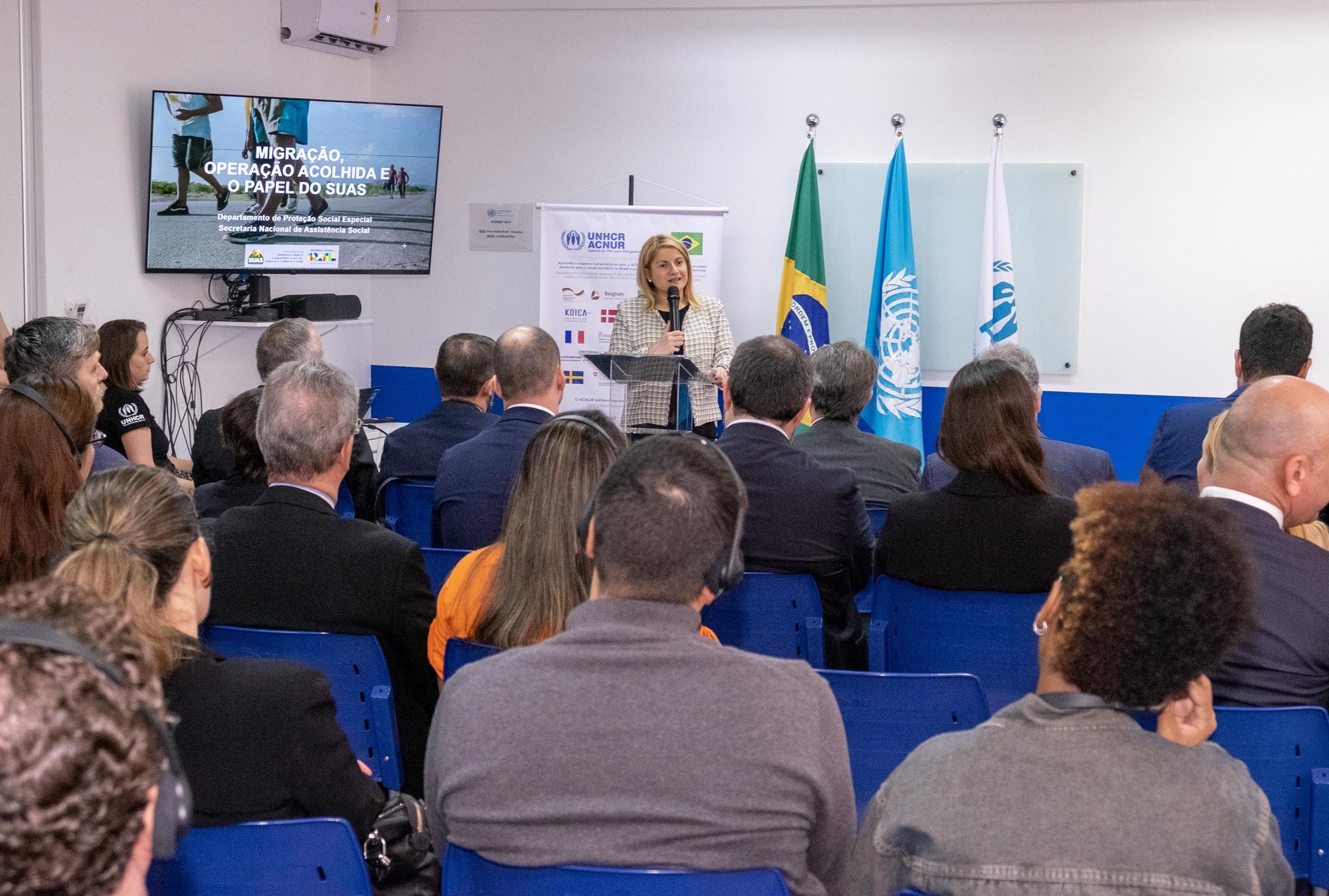On the occasion of the visit to São Paulo by Maria Tripodi, Undersecretary of State for Foreign Affairs and International Cooperation of the Italian government, the United Nations High Commissioner for Refugees (UNHCR) organized the event "The Venezuelan Humanitarian Crisis and the Importance of International Cooperation Support," with the support of the Italian government, AVSI Foundation and its founding member AVSI Brasil, to explore the global strategy for an effective response to the humanitarian crisis of Venezuelan refugees and migrants in Brazil.
The event took place on Thursday, April 11, at UNHCR headquarters in São Paulo and was attended by UNHCR Brazil Representative Davide Torzilli, Migration and Human Law Institute (IMDH) Director Rosita Milesi, Brazilian Government Representative Regis Spindola, Undersecretary of State for Foreign Affairs and International Cooperation of the Italian Government for South America Maria Tripodi, and Giampaolo Silvestri, AVSI Secretary General.
Giampaolo Silvestri, AVSI secretary general's speech at the event "The Venezuelan Humanitarian Crisis and the Importance of International Cooperation Support"
We are a field organization and we are very proud of that. Our work on the ground helps us learn a lot and we don't AVSI is a grassroots organization and very proud of that. We learn a lot from the field, and we don't want to keep the lessons learned for ourselves, we want to share them in the places where we have the opportunity to discuss on them, to decide policies and find innovative ways to address situations of crisis and inequality, where human rights are threatened.
This is why we’d like to share what our long experience in Brazil has taught us on the sensitive issue of migration: the reception and integration of migrants and refugees is putting a strain on many countries given the overwhelming size it reached over the last few years.
AVSI has been working in Brazil since 1983, implementing international cooperation projects in collaboration with the Italian government. We have nurtured and curated networks of personal relationships that helped us get to know the needs of the most vulnerable people.
In all the countries where we are present, we foster the growth and creation of local organizations sharing our same vision. This form of localization helps read and respond to local needs while maintaining a link with international agendas.
In Brazil, this process led to the creation of AVSI Brazil, a local organization that in 2023 supported 850,000 direct beneficiaries with 54 projects in 12 states of the Brazilian federation, with a social investment of more than 20 million euros.
AVSI’s main activities in Brazil have been tightly linked with development until 2018, when the Venezuelan humanitarian emergency broke out. The arrival of a large number of Venezuelan migrants called for a change of strategy, prompted by the visit of the Italian government to Boa Vista toward the end of 2018, when the Italian representatives could witness the tragic conditions in which Venezuelan refugees were living.
The Italian government’s visit allowed to start a dialogue with UNHCR and made it so that AVSI could start contributing to the humanitarian response in Boa Vista, capital of the state of Roraima, through the reception and protection of Venezuelan refugees, who were living in extremely precarious conditions in the city public spaces.
AVSI became part of the Brazilian federal government's "Operação Acolhida" partnership to assist Venezuelan refugees. It has managed reception centers, welcoming more than 151,000 people in less than five years. With each project, AVSI aims at fostering individual development, promoting autonomy and integration. In Brazil, AVSI accompanies refugees throughout the whole process of integration, from their arrival at the border to the beginning of a new life in a new city. In collaboration with the U.S. State Department, AVSI created the "Acolhidos por meio do trabalho" project to promote the socioeconomic integration of thousands of people in 60 Brazilian cities.
AVSI’s method begins with recognizing everyone’s value and considers each person as part of a network of relationships. For this reason, we foster a process of integration that keeps an entire family together, offering social assistance during the first months of arrival in the host cities, to guarantee access to basic services such as education, health, housing, access to social protection programs and integration into the local community network.
In collaboration with the Bishops' Conference of Brazil and the Migration and Human Development Institute, linked to the Scalabrinian Congregation, the Good Samaritan House was created in the city of Brasilia in 2021. This is a temporary reception center, where 666 people have been hosted. The House has developed an original co-management method, where Venezuelans take up an active role in helping manage the facility, together with 47 volunteers. Such a method is based on seven principles:
- welcome
- discipline
- trust
- human enhancement
- compromise
- respect
- spirituality
This experience in Brazil has taught us that the multistakeholder approach is a winning method, that can bring together different actors, perspectives, tools and resources to design and implement successful solutions.
It calls into play, at various levels and in different countries, the following actors:
- local, national and international institutions, acting as compliance guarantors that can monitor the processes of reception, integration, job placement, and repatriation;
- civil society organizations and NGOs, which have a fundamental knowledge of the impact of migration and other phenomena on our societies/communities, and can support the process of reception, job placement, voluntary repatriation;
- the private sector, as partners in integration and job placement pathways.
(Photo by José Luiz Altieri)





